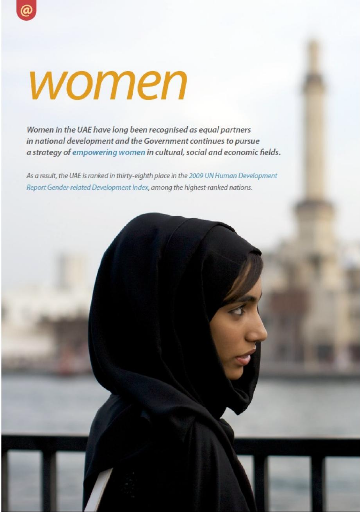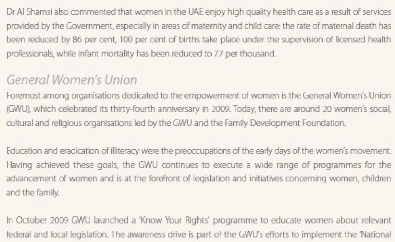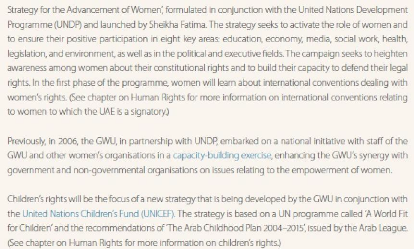Annexe 30 : Photographies des îles
artificielles.

149
150
Annexe 31 : La place de la femme dans l'Emirat de
Dubaï.
151


The GD! Compared to the HD! -- a Measure of Gender
Disparity
|
GDI as%ofHDI
|
Life expectancy at birth (years) 2004
|
Adult literacy rate
(% ages 15 and oIden 2004
|
Combined primary, secondary and tertiary gross enrolment
ratio 2004
|
Female as 46 male Female as 96 male Female as 96
male
135 173
Equatorial Guinea Mali 02999
Mongolia c1o0o961
1
Russian Federation (121.7%)
1
Lesotho (1225%)
3
Haiti class%
1
Cuba p2ua9/4
2
United Arab Emirates ;120.4%]
152
136 174 4 3
Eritrea (97.39p 1mor-Leste {taw) Malta (I 02.5%) Qatar
(1113.246)
|
137 175 5
U rifted Arab Emirates United Arab Emirates United Arab
Emirates
147.296i 1142.99rO1 4142.2%)
|
4
Latvia in n%)
T.19fi)
|
|
138
Sierra Leone (971%)
|
176 6
Tanzania Antigua and Barbuda
(United Republic oi) (102.9N c101.096)
|
5
Barbados [11 6296)
|
139 177 7 6
India (97.196) Solomon Islands 0 02.B%$1 Mongolia
f100.9961 Estonia (i 16.196)
155 190 145 175
Afghanistan otim Swaziland {gam Afghanistan c29-299
Afghanistan fss 961
The gender empowerment measure (GEM) reveals whether
women take an active part in economic and political life. It tracks the share
of seats in podia ment held by women; of fema le legislators, senior officials
and managers; and of female professional and technical workers - and the gender
disparity in earned income, reflecting economic independence. Differing from
the GDI, the GEM exposes inequality in opportunities in selected
areas.
United Arab Emirates ranks 251" out of 1D4
countries in the GE lrwith a value cf 0.691.
Saure UN J urnorr DeLdoprnent hsLer
2009.
T88> UJAE2010
Much of the policy of empowerment has been orchestrated by
Sheikha Fatima hint Mubarak. Cha irwoma n of the General Women's Union, Supreme
Chairperson of the Family Development Foundation and President of the Arab
Women Organisation_ In the year under review, Sheikha Fatima gave a number of
interviews in which she outlined the achievements of women in the UAE and
continued to stress the necessity of ongoing support for Arab women's rights,
especially the social and political roles of women in the region.
Sheikhs Fatima commented on the occasion of UAE National Day
20097
'Under a wise leadership that believes invesrrng 1n people
is afire most viable form ofirwves toren t we are confident
that UAE women will continue to be successful. It is enough to say ?hat UAE
women are no longer busy claiming their rights, bur exercising firem'
UAE women today participate in all institutions of government,
including the executive, legislative and judicial components_ Four women sit at
the Cabinet table, nine out of 40 members of the Federal National Council are
women and a number of women judges and attorneys, as well as two women
ambassadors, were appointed in the past year UAE women enjoy careers as pilots
and engineers with national air carriers and in air defence and have also
joined the UAE Armed Forces, police and customs_ In fact, UAE women now
constitute 66 per cent of the public sector workforce, 30 per cent of whom are
in senior posts. Women also make up 15 per cent of the teaching staff at the
UAE University and hold 60 per cent of the jobs in professions such as
medicine, teaching, pharmacy and nursing.
Despite a relatively low representation overall in the prorate
sector UAE national women are doing well in business and the 12,000 members of
the Businesswomen Council run 11,000 investment projects worth Dh125 billion_
UAE national women also represent 375 per cent of the workforce in the banking
sector
During the year, gender equality in the UAE in areas such as
education, health care and employment was a topic of
discussion at the second Ministerial Conference of the Non-Aligned Movement
(NAM) on the Advancement of Women, held in Guatemala City Dr Martha Al Shamsi,
UAE Minister of State, pointed out that the percentage of girls enrolled in UAE
elementary schools, at 83 per cent, is approaching parity with the enrolment of
boys, whereas at higher levels, women comprise 70 per cent of the total number
of university graduates, exceeding men, with a steady increase in the number of
women holding Masters and PhD degrees.
153
89 > women
154


155


The GWU has also been instrumental in helping to establish the
Arab Women Organisation and has taken part in al I its conferences (see below).
Since 1975 the GWU has also participated in all significant major international
conferences on the development of women. In February 2007 the UAE was elected
as a member of the Social Development Committee of the UN's Social and Economic
Council. This clearly reflects the progress made by UAE women and their active
partidpation in both regional and international arenas.
Arab Women Organisation
The second conference of the Arab Women Organisation (AWO), an
inter-governmental body established under the umbrella of the League of Arab
States, was held in Abu Dhabi in November 2008. Following the completion of its
organisational structure, formulation of its general policy and creation of the
executive mechanisms, the focus now is on achieving the goals of the AWO. These
include empowering women and building their capacities as human beings and
citizens to play an effective role in society, in the labour market, and in
decision-making circles.
As Sheikha Fatima, who was chairperson of the AWO from 2007 to
21309, commented after following the conference:
will continue to work in consultation with my sisters, the
First Ladies in the Organisation, to create a real qualitative shin in the
mechanisms of work and the activities of the organisation... i will
also be committed to tlreenhancementof the position of Arab women
on the regional and international level, with the knowledge that we
are an integral part of the world; we will be affected by the developments
around us, we will interact with what goes on, will contribute to them with
what we own from our wealth, culture andcrvrlrsation. in that arena,
we will work to project the real image of the Arab woman!'
Media Strategy
Recognising that the media plays a pivotal role in social
development, changing media stereotypes of Arab women and their role and status
in society is a key component of Sheikha Fatima's strategy Based on this
commitment and in implementation of the recommendations made during the first
Arab Women summit held in Cairo in 2C00, Abu Dhabi hosted the Women Media Forum
in 2002 under the title 'Woman and Media: towards a promising media landscape'
The Forum culminated in the promulgation of the Abu Dhabi Declaration on Women
and Media, which provided a strong foundation forthe launch of the Women Media
Strategy as well as the endorsement of the first media convention for Arab
women.
156
;92 > rJ,4E20 r0 Right UM women enjoy careers
aspilots and engineers with narbra orr carriers.

157
The Women Media Strategy contained recommendations for
implementing three programmes that were formally launched under the umbrella of
AWO during the second conference in Abu Dhabt namely the setting-up of a media
agency for Arab women, a media monitoring project for Arab women and the media
professions programme. The strategy aims, over an implementation period of six
years, commencing in 2010, to create a positive media culture towards Arab
women, thereby enhancing the role and status of women in society
Sheikhs Fatima elaborated on the thinking behind the strategy:
also look forward to media that would reflect our
nationalidentrt-y embody our values, outhentici ty and civilisation
as well as Arab and fvfuslim values of our society, avoid focusing on
stereotypes of women but rather safeguard theft dignity, focus on
efforts to make their achievements on all levels more visible removing
obstacles that hamper the expansion of UA E womerfs
participation and work in the media.'
Human Security
Human security, Sheikha Fatima believes, is basically a
universal issue but one where women can play a major role both in the peace
movement and by helping to attain their own security. In her inaugural address
made at the second meeting of the Supreme Council of the AWO, she declared: 'If
the decision to go to war is made by men, then women can and should, become the
makers of peace'. To confront this issuer she believes, needs
cooperation and coordination on a global level, through openness and positive
dialogue among civilisations
Arab women are contributing to human security through a
pioneering initiative that came in the form of the Women For Peace Conference
which was held in 2002 in Sharm el-Sheikh with the participation of women's
organisations from Arab and non-Arab countries and the UN. The aim was to
promote the establishment of a global movement of women to play an active role
in spreading the culture of peace.
Even before this conference, Sheikha Fatima had set up a
special fund forwamen refugees, in cooperation and coordination with the MHO*
and earmarked US$2 million to improve the lives of women refugees in war
zones
158
794> UAE20ia
The issue of security was discussed intently during the second
AWO summit, and the conference urged the implementation of international
conventions concerning the protection of women, which would contribute to
alleviating the physical and psychological hardships that families experience
in times of armed conflicts.
Network for Arab Women
Sheikha Fatima launched the Network for Arab Women in the
Diaspora (NAWD) during the first AWO conference in Bahrain in 2046 to help Arab
women living abroad keep in touch with each other, and provide information for
them, thereby relieving the isolation they face away from their home countries_
The NAWD also facilitates an exchange of views and enables Ara b women to
connect with their Arab and Islamic culture.
The first phase of the initiative was launched in February
2007 The second phase, which got underway from March to October 2008, saw the
collection of data from over 1044 distinguished Arab women academics and
professionals in various countries around the world with a view to informing
young Arab generations in the Arab world about their achievements. The third
phase, which was inaugurated at the second AWO conference in Abu Dhabi in 2008,
will run up to November 2010 and will involve direct communication with Arab
migrant women_ The fourth and final phase will feature direct online
dialogue_
Tunis Summit
Sheikha Fatima, participating in the fourth session of the
supreme council of the AWO held at the First Ladies' level in Tunis, in June
2009, underlined the importance of the periodic sessions as they provide the
opportunityto assess and evaluate results and plan for the future.
Sheikha Fatima stressed that a united approach among the First
Lad ies ofthe Ara b world would be a significant factor in assisting Arab women
to overcome obstacles that hamper their progress, adding that 'we have resolved
to continue cooperation with leading Arab women at all levels to empower women
to contribute effectively in sustainable growth'_ 'For Arab women to achieve
progress and contribute effectively to the institutions of civil sodety, she
continued, 'women must pursue education and keep abreast ci
progress, while at the same time remaining true to their identity, national
allegiance, religious teachings and cultural values' During the Tunis summit;,
it was agreed to hold a symposium in 2010 at the United Nations and to issue a
book about the second Arab Woman Conference held in Abu Dhabi. Another major
milestone was the addition of Iraq to the membership, bringing the number of
members to 15 countries. The organisation is looking forward
to other Arab countries joining them to serve the cause of
women
159
r95> womrren
160
161
| 


